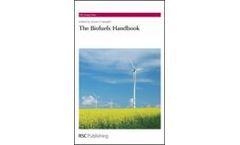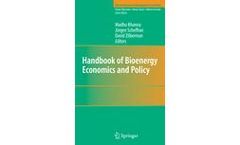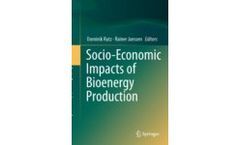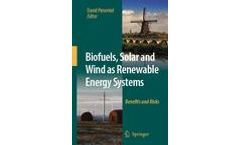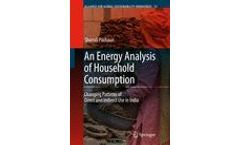Refine by
biofuel books
19 books found
Climate Crisis Energy Violence: Mapping Fossil Energy's Enduring Grasp on a Vulnerable Future communicates the extremity, breadth and extent of energy violence across energy sources, sectors and geographies. The work accommodates structural, ecological, institutional, physical and economic forms of energy violence, exploring the field through novel research methods and data sources, including the ...
Focusing on some of the most important alternate energy sources for the foreseeable future, the Handbook of Plant-Based Biofuels provides state-of-the-art information on the status of the production of biofuels, in particular, bioethanol and biodiesel. ...
With the dwindling supplies of fossil fuels and growing concerns regarding climate changes due to green house gasses from these fuels, public opinion has swung dramatically towards favoring the development of renewable energy sources. In Biofuels: Methods and Protocols, career-long experts explore a full range of methods for bioenergy covering important topics such as biomass ...
The development of renewable and sustainable lignocellulosic biofuels is currently receiving worldwide attention and investment. Despite decades of research, there remain significant challenges to be overcome before these biofuels can be produced in large volumes at competitive prices. ...
J.M. Otero, G. Panagiotou, L. Olsson: Fueling Industrial Biotechnology Growth with Bioethanol.- M. Galbe, G. Zacchi: Pretreatment of Lignocellulosic Materials for Efficient Bioethanol Production.- R.P. Chandra, R. Bura, W.E. Mabee, A. Berlin, X. Pan, J.N. Saddler: Substrate Pretreatment: The Key to Effective Enzymatic Hydrolysis of Lignocellulosics?- S.T. Merino, J. Cherry: Progress and ...
Petroleum-based fuels are well-established products that have served industry and consumers for more than one hundred years. However petroleum, once considered inexhaustible, is now being depleted at a rapid rate. As the amount of available petroleum decreases, the need for alternative technologies to produce liquid fuels that could potentially help prolong the liquid fuels culture and mitigate ...
Public policies and private investments around the globe are aiming to increase local capacity to produce biofuels. A key constraint to the expansion of biofuel production is the limited amount of land available to meet the ...
Biofuels for Road Transport: A Seed to Wheel Perspective provides a review of the history, the current status and perspectives for biofuels used in road transport, across the full ‘seed-to-wheel’ life cycle of these fuels. Successive chapters cover the history of biofuels; the first- and second-generation liquid fuels and ...
Biofuel is a renewable energy source produced from natural (biobased) materials, which can be used as a substitute for petroleum fuels. The benefits of biofuels over traditional fuels include greater energy security, reduced environmental impact, foreign exchange savings, and socioeconomic issues related to the rural sector. Furthermore, biofuel ...
One option for the production of liquid biofuel in Finland is based on fluidized bed gasification of biomass and Fischer-Tropsch synthesis process. ...
Around the world, many countries are increasing efforts to promote biomass production for industrial uses including biofuels and bio-products such as chemicals and bio-plastic. Against a backdrop of lively public debate on sustainability, bioenergy wields both positive and negative impacts upon a variety of environmental and socio-economic issues. ...
Biorefineries: For Biomass Upgrading Facilities examines the variety of different technologies which integrated bio-based industries use to produce chemicals; biofuels; food and feed ...
Hydrogen promises to be the most significant fuel source of the future, due to its global availability and the fact that water is its only by-product. Biofuels such as ...
Currently, a heavy focus is on biofuels made from crops, such as corn, ...
This Codex EU Energy Law brings together the most important, presently applicable, legislation on energy, as adopted by the EU. The legislation has been booming in recent years, after decades of very limited European activity in the field, with the exception of coal and nuclear. Several drivers explain this increase: the liberalisation of the European gas and electricity markets, the awareness to ...
The book takes a socio-economic approach to analyzing the energy system and energy consumption in India from a household perspective. In doing so, it views households as the ultimate end-consumers and estimates and analyzes the direct and indirect energy requirements of household consumption, both at an aggregate national level as well as for individuals or groups of households. In addition, the ...
The next few decades will see a profound energy transformation throughout the world. By the end of the century (and perhaps sooner), we will shift from fossil fuel dependence to rely primarily on renewable sources like solar, wind, biomass, and geothermal power. Driven by the need to avert catastrophic climate change and by the depletion of easily accessible oil, coal, and natural gas, this ...
New and renewable energy systems will play an important role in the sustainable development of a future energy strategy. Recent development in this field has proved that the virtual energy system including new and renewable energy sources is feasible. The promotion of renewable sources of energy is a high priority, for security and diversification of energy supply, environmental protection, and ...
Report 4130: The Bioenergy Industry examines the biopower sector, including companies in biomass gasification, anaerobic digestion, landfill-gas-to-energy and conventional combustion. It also covers the ethanol sector and emerging algae and cellulosic technology. This 67-page report includes charts of growth forecasts for the U.S. bioenergy industry, global ethanol production, lists of top U.S. ...






